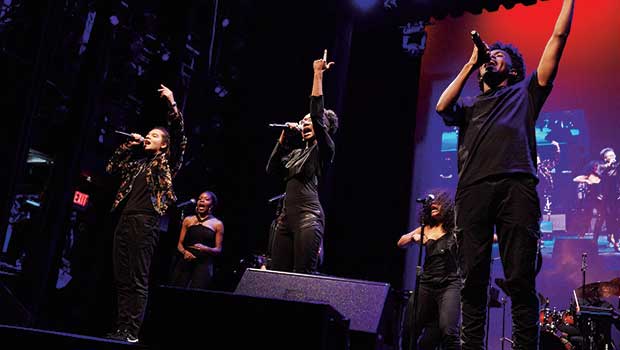
On Monday, Feb. 5, Berklee College of Music kicked off its Black History Month programming with “Black Gold Series, Chapter 1,” a celebration of historically black music, and a keynote speech by Opal Tometi, co-founder of Black Lives Matter.

Author: Dave GreenPerformers in Berklee’s “Black Gold” concert series.
On the web
Check the Berklee performance calendar by visiting: www.berklee.edu/BPC/calendar
Tometi spoke about her experience founding Black Lives Matter, the power of activism and education, and police violence. She encouraged the audience to continue arming themselves with knowledge and recommended books such as “Invisible No More: Police Violence Against Black Women and Women of Color” by Andrea Ritchie. Tometi says, “Every 28 hours an unarmed black person is killed by a vigilante, a security guard or the police. I have two younger brothers, and I don’t want this to be the end of the story for them.”
In addition to the performances, the Bill Pierce MLK Scholarship was awarded to Dominique Jones, a songwriting and music business dual major, and Zoe Schneider, a music business and management major. Berklee’s Association of Faculty and Staff of African Descent lobbied for the scholarship, looking to recognize the talent and hard work of black students. It’s awarded to students in their final semester, as an extra push to the graduation finish line.
Music stylings of the evening ranged from Afro-Caribbean to Neo-Soul to ’90s R&B. Students and guest artists performed, often under the direction of a faculty member. Sean Skeete, executive producer of the event, says education is key when it comes to black music. “I think the next generation of artists going out into the world needs to know this history,” he says. “The music we have now and the culture we have now didn’t start yesterday.”
Though the “Black Gold” series currently is annual, Berklee will be hosting other celebrations of black music throughout February. Dianne Reeves, a preeminent improvisational jazz vocalist, performs on Feb. 16; Terence Blanchard Ensembles, led by Terence Blanchard, a trumpeter, composer and visiting scholar in Berklee’s Jazz Composition Department, performs on Feb. 27.
“We’re at a time in history where the contributions of people of African descent to pop culture and the arts need to be highlighted, more than ever,” says Skeete. He describes this event as a test drive for future Black History Month programming. He hopes that the series will grow to include workshops, clinics and lectures next February.
Hopefully people walk away feeling inspired to explore more music from the African diaspora, he says. “It’s easy for that narrative to get lost.”







